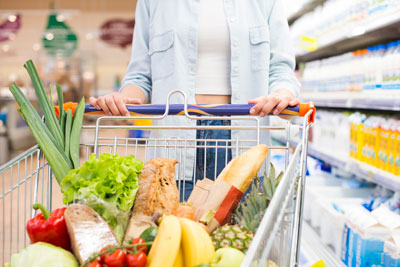21FEB Changing the environmental impact of retail
2019 saw climate activism come to the forefront with David Attenborough addressing Glastonbury Festival, Greta Thunberg leading the school strikes and Extinction Rebellion using stunts to draw attention to environmental issues. With international targets to reduce our carbon footprint, the desire to eradicate single use plastics and the public being more aware of their environmental footprint, the retail and FMCG industry are having to react to this growing movement.
The retail industry has long been a major contributor to global carbon emissions, due to the use of plastic, global supply chains and the desire to create more convenient products at sensitive price points. With the consumer becoming more aware of the impact of supply chains and packaging on the environment, there is now a race for both brands and retailers to reduce their footprint.
 We have already seen trials of plastic free fruit and veg sections, various attempts to find alternatives to plastic packaging and a number of stores removing plastic carrier bags. Whilst these are all positive steps for the environment, they will all only work if the shopper embraces them.
We have already seen trials of plastic free fruit and veg sections, various attempts to find alternatives to plastic packaging and a number of stores removing plastic carrier bags. Whilst these are all positive steps for the environment, they will all only work if the shopper embraces them.
Brands are challenging their own packaging and consumers purchasing norms by introducing various buying metrics to reduce down on multipacks. There are also interesting trials in stores to remove unnecessary packaging and everyone involved in retail is still learning what works and what doesn’t.
All the Acosta Europe businesses have seen this first hand, having been involved in a number of trials across the country. What has been clear to us is the need for buy in from all relevant parties. This includes the brand, the retailer and the consumer. If one of these falls down, it becomes harder to change engrained buying habits.
The other aspect that we have seen from our involvement in trials is the need for education. People are naturally sceptical of change and the educational piece our field representatives have been able to do has helped store colleagues understand the changes and the reasoning behind them. Through these experiences we have gained a greater insight into what makes the changes a success.
We are undoubtedly at a crossroads with regard to the environment and awareness of the corporate social responsibility that all businesses have. New, challenger brands are pushing the boundaries of possibilities and able to champion causes such as the environment as unique selling points, this is something the more established brands are now having to combat. The upshot of this is wastage and single use materials are declining, local producers are winning and the environmental impact of the modern consumer is slowly reducing.
There is still a lot to be done with regard to the supply chain and reducing the carbon footprint of retail to acceptable levels, it is a challenge that everyone needs to rise to from producers to retailers, brands to agencies. The trend to buy more environmentally friendly produce is growing year on year, with 2020 looking like the year the household names fully step up to the mark.


